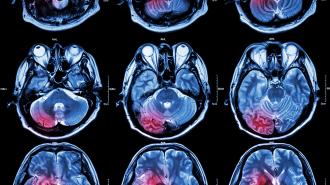Dementia frequently occurs after a stroke, causing memory, gait, and focus problems. It is thought to be a side effect of the body’s natural immune response to dead brain tissue left behind after a stroke.
According to the World Health Organization (WHO), stroke affects more than 15 million people worldwide each year. Unfortunately, there are currently no medications specifically designed to reduce the risk of dementia from a stroke.
“Immune cells rush in to clean up and make repairs, but they get overwhelmed and draw in other immune cells that make toxic substances to process the dead tissue. Unfortunately, these substances also damage areas that weren’t hurt by the initial stroke.”
Kristian Doyle
However, researchers have uncovered a potential therapy that could help lessen the incidence of post stroke dementia — and it’s already FDA-approved.
The problem: When blood vessels in the brain become clogged or constricted, they can cut off oxygen and nutrients to the brain and destroy brain cells. This is the root cause of ischemic strokes.
Stroke can be treated if caught early, and there are drugs that can break up the blood clots that cause many strokes.
However, after a stroke, the leftover dead tissue triggers an inflammatory response, where immune cells flood the site of injury to clean up any dead or damaged cells so healing can progress.
But prolonged inflammation can also harm good tissue, which can lead to post stroke dementia.
Brain cells are also packed with cholesterol, which is difficult for immune cells to eliminate. So inflammation caused by a stroke might linger for months, spreading to healthy areas of the brain and killing more brain cells.
“Immune cells rush in to clean up and make repairs, but they get overwhelmed and draw in other immune cells that make toxic substances to process the dead tissue. Unfortunately, these substances also damage areas that weren’t hurt by the initial stroke,” immunobiologist Kristian Doyle, the study’s principal investigator, said in a statement.
But one potential way to thwart that process and stave off post stroke dementia is by cleaning up the excess cholesterol in the brain.
What they found: Doyle’s team from the University of Arizona looked into cyclodextrin, an FDA-approved drug ingredient. The drug can scoop up and store cholesterol without causing a harmful inflammatory response.
They tested the drug in animals after a stroke and found less cholesterol accumulation and inflammation in the brain. There were other positive effects suggesting a reduction in post stroke dementia, they reported in the study published in the Journal of Neuroscience. In the animals, the drug reduced neurodegeneration and personality changes, like impulsivity and memory loss.
“Cyclodextrin helped remove cholesterol derived from the breakdown of dead brain cells, dampen inflammation and improve recovery,” Doyle said.
The drug will still need to go through human trials to prove that it is an effective way to prevent dementia after a stroke, but because the drug is already FDA-approved, that could speed up the testing and regulatory process.
Putting it all together: Strokes come on suddenly and have few treatment options, so researchers hope to find ways to prevent strokes before they happen, as well as reduce long-term damage and help patients recover.
Researchers are trying to find treatments to delay a stroke or prevent it from happening again, and they’re inventing creative solutions for helping stroke victims get back on their feet with exoskeletons or nerve stimulators.
If this medication can reduce cholesterol in the brain after a stroke, it could reduce the risk of post stroke dementia.
We’d love to hear from you! If you have a comment about this article or if you have a tip for a future Freethink story, please email us at tips@freethink.com.
